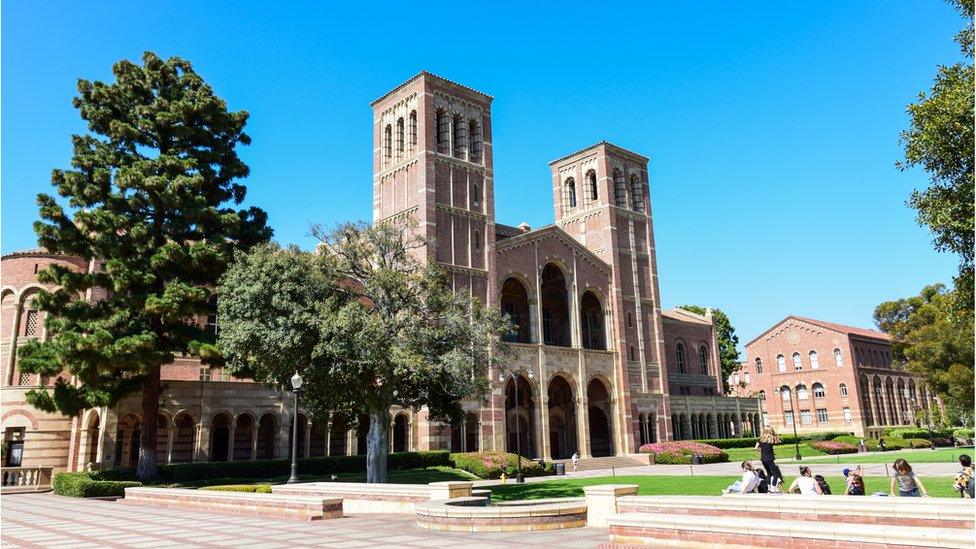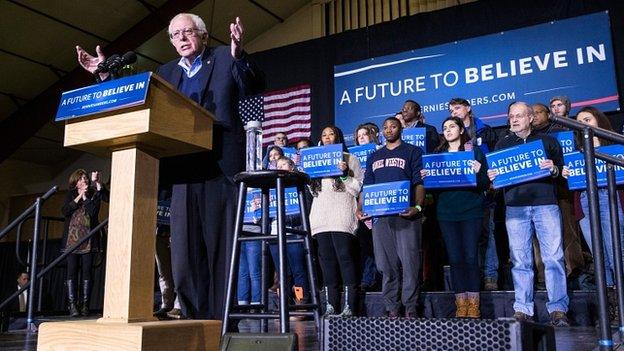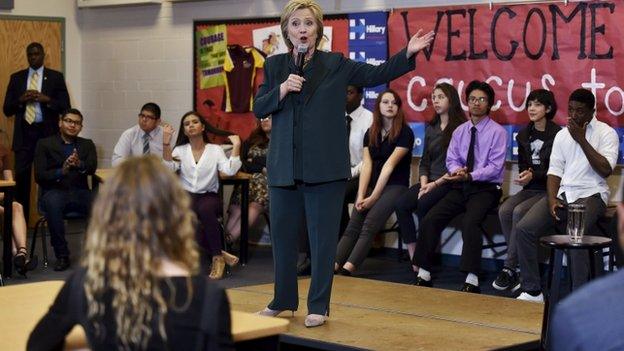Tuition fees: Is England more expensive than US?
- Published

UCLA in Los Angeles has similar tuition fees to UCLAN in Preston
University tuition fees might be high in England but they are not as eye-wateringly expensive as in the United States.
Or at least that's the conventional wisdom.
But is that really true? Or is it based on extreme examples, like Harvard charging almost $60,000 per year (£42,000) or Yale $48,000 (£34,000)?
How about looking more widely? For instance UCLA compared with UCLAN?
UCLAN is the University of Central Lancashire in Preston - and its preferred acronym nods towards the sunny campus of UCLA, the University of California, Los Angeles, ranked in the world's top 20 universities.
Preston v Los Angeles
They might sound like different worlds, but UCLAN's fees are now more or less the same as UCLA.
The Preston-based university charges £9,000 per year for tuition for undergraduates - and UCLA charges $13,251, which at current rates is about £9,350.

Bernie Sanders has promised to scrap tuition fees
A few weeks ago, before sterling fell against the dollar, the fees in California were actually cheaper.
Or if you compare the University of Washington with the University of Wolverhampton, would you expect tuition fees to be lower at Washington?
Tuition fees in Washington are $11,839 (£8,354) compared with £9,000 for courses at Wolverhampton - or any other university in England.
The average across US public universities is $9,410 (£6,610).
Peggy Blumenthal of the New York-based Institute of International Education says this touches on one of the biggest misconceptions about US higher education.

University of California, Berkeley has a "middle class access plan"
"There is a huge range in tuition costs," she says. And in practice, many US universities have comparable costs with those in England and across Europe.
State universities - the great engine room of US higher education - have a two-tier fees system, so that students living in the state pay much less than those from outside.
And for state universities, many students live at home, so they avoid all the extra costs for accommodation.
Housing costs
The other confusion is that when US universities quote prices, they often include bed and board as well as tuition.
Parents in England, who can console themselves that tuition fees won't have to be repaid until after graduation, are often taken aback at the separate cost of accommodation and living costs.

There are growing calls in the US to reduce college costs, while England's fees are set to rise
Even for those painfully expensive private US universities, Ms Blumenthal says the headline figures can be misleading.
"Very few Americans pay the sticker price.
"US universities have a practice of discounting the admissions price. You get a letter saying congratulations, you're admitted to our university, and because you have financial aid, we're going to give this package of loans and scholarships."
And she says many deals provide a guarantee of work on campus for students, to make it more affordable.

Hillary Clinton has campaigned to make college more affordable
But a spokesman for UCLAN says there are also bursaries for its students - with more than half of first years receiving up to £2,000.
"While there are aspects of the government's fees policy that continue to cause concern we are determined to work within it," said the UCLAN spokesman. And he said application figures showed students were not being deterred by cost.
Another factor to be taken into account is that US undergraduate degrees tend to be four years, rather than three in England, adding another year of fees to the overall cost.
Higher or lower?
But where are fees headed next? And perhaps that is the most striking contrast.
In England, the government has signalled that fees will move upwards above £9,000. Universities have already been pushing to be able to charge more.

Student protests were held against the raising of tuition fees to £9,000
But in the US, the argument has been in the opposite direction - about how costs can be cut. The level of student debt, above a trillion dollars and rising, is increasingly seen as unsustainable.
In the presidential elections, Democrat rivals have been competing to sound the toughest on making college more affordable.
Hillary Clinton is promising a "New College Compact" with financial support to help students.
Bernie Sanders has outbid her with the promise to make tuition entirely free in public universities, saying that if Germany can scrap fees, there is no reason why it wouldn't be practical in the United States.
"The middle class has no disposable income because of wage stagnation," says Ms Blumenthal.
Middle-class handouts
It means the classic American dream of sending the children to college is proving a financial nightmare.
"If you are a middle-class family and you have two or three children who are going to be in college at the same time, you are totally unable to pay for it.

The American dream of going to college is under financial pressure
"But your income might be such that you do not qualify for grants."
Universities are now offering help to this squeezed middle, making no secret of who they are targeting.
The University of California, Berkeley, where fees for in-state students are $13,342 (£9,400), has launched a "Middle Class Access Plan".
This offers financial support to families with a combined income of between $80,000 (£57,000) and $150,000 (£106,000), who might be income-rich but cash-poor.
Technology to cut costs
The top private universities are also aware of the need to hit the brakes on costs.
John Hennessy, president of Stanford University, told the BBC: "The levels of debt cannot continue to go up at the rate that they've been going up.
"We're going to have to find a way to deal with that, whether it's income-based repayment or some other scheme."

Could online technology reduce the cost of higher education?
He suggests online technology could be the way to reduce costs, so perhaps students could spend part of their time studying online from home, with interactive video classes, as well as spending time on campus.
But he says students can be the most resistant to such changes, wanting no dilution of the complete university experience.
And while fees in England are, in effect, flat - with more or less all universities charging £9,000 - in the US they can have a completely counter-intuitive relationship with quality.
Research from the INSEAD business school in France showed that when US universities had a decline in rankings, they were more likely to increase rather than cut fees.
It was described as the "Chivas Regal strategy", in reference to the claim that the whisky brand increased its popularity and status by pushing up the price.
On average, US tuition fees had increased by 500% in real terms over the past three decades, the study found, without any link to improvements.
Of course, there is another huge difference between England's student costs and the US.
In England, fees do not have to be paid up-front. Repayments begin only when students are earning above an income threshold of £21,000 - and debts are written off after 30 years.
It's a system that has been backed by the OECD as an example of a long-term sustainable approach to university funding, which does not demand payment at the point of access.
And England is not the same as the rest of the UK, where Scotland has no fees and Wales and Northern Ireland charge about £3,800.
Pam Tatlow, chief executive of the Million+ group of new universities, says universities recognise the public concern, but the fees have replaced funding once received from government.
But she says the international examples show there is nothing inevitable about how students pay for university.
"I don't think anyone should think that the higher education funding system is set in stone."

More stories from the BBC's Global education series, external looking at education from an international perspective and how to get in touch
